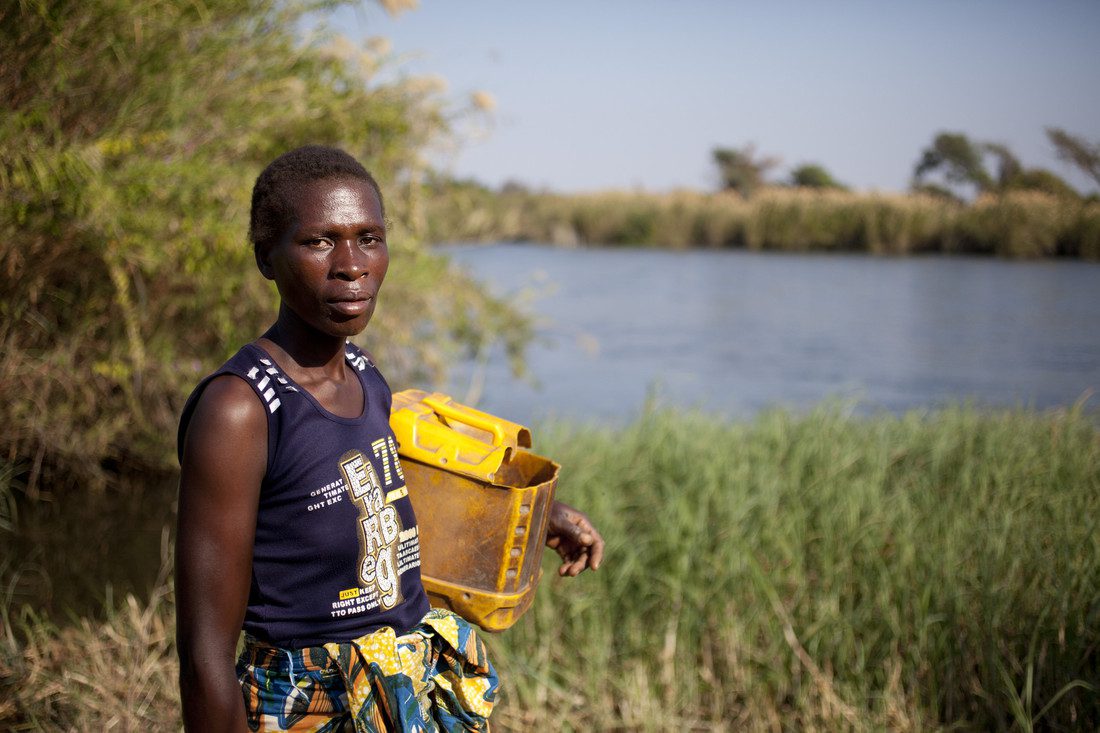
“We don’t want to be like lost people in this world. I feel like a lost person.”
Barbara’s house is made of mud and has a tin roof. She’s sitting outside, tearing Kalembla leaves from their stems, dropping them into a small bowl on her lap. Her two children Gertrude (10) and Edward (5) are next to her, their eyes fixed wide. They are subdued, limbs propped around each other, stroking the dry earth with their feet. Barbara’s children are lethargic in comparison to the children from neighbouring houses, who are playing a ball game, jumping, cheering, and running.
“Life here is hard. It’s full of suffering”, says Barbara, “In most cases we have one meal per day. We are very hungry. Sometimes our children say it’s too much. We go to sleep hungry. I have pain when I don’t have food and I can’t provide for my children. There is nothing we can do – my children cry and cry.
“Sometimes when we are hungry and we take water on an empty stomach we feel sick. In the morning when I wake up, I try to find the little resources I can, I do gardening and find what food we can to eat. Life goes on. I usually sell one bag of kalembra (sweet potato leaves) each week. I earn 25 kwacha per week (approximately AUD $5).
“The house I’m staying in is a mud house. During the rainy season the walls start to dissolve. The door is almost falling down because termites have eaten through the door surround. Inside we don’t have proper bedding.”
Chiawa, where Barbara and her two children live, is 170 kilometres south-east of Lusaka, in Zambia. It’s a rural area with few transport links, health centres, and employment opportunities. Barbara is a widow who risks her life every day to irrigate her crops and feed her two children.
“We carry containers to get water from the Zambezi River. It’s just me. It’s very difficult. If you are unlucky you can be eaten by the crocodiles in the river. I know a lot of people who have been killed. I go there every day to collect water – there’s no alternative. We are scared we might die, but there’s no other way to get water.”
Barely surviving on less than a dollar a day, Barbara struggles to see a way out of the crippling poverty her family face. She manages to send her daughter Gertrude to school but after grade 7 it will no longer be free and so inevitably her education will end there.
Uniforms, school books and registration fees make even basic education unattainable to families like Barbara’s, thereby reducing their opportunities for employment and continuing the crippling cycle of poverty.
We are not the same
“People are worse off in rural areas”, says Barbara, “we are not the same. Others are better off. People who have money have been to school, which means they can make plans to make money, and then they can send their children to school. This maintains the status quo. People who don’t have these opportunities remain poor.
“I would like to have had an education. I would have been doing something better. I would like to have been a nurse or teacher. Better employment means better opportunities. When people are recruiting, I would have had a better chance.
“There is a lot of difference for those people who have money. They have good houses and can buy second houses. They have lots of things – even cars. I don’t believe it will ever be fair. It should be that everyone is equal. We are better off if we are all at the same level. To us, the poor, I don’t know how it will change. The way to a better life is only possible through education.”
As world leaders meet in Brisbane for the G20, Oxfam calls for Inequality to be put on the agenda and even up the gap between the rich and poor. Across the world 85 of the richest people have the same wealth as 3.5 billion of the poorest. The wealthy few have an enormous power to influence the rules, meaning countries worldwide end up with government policies that favour the super rich rather than those most in need.
Every child deserves the right to an education, to eat a nutritious meal, to sleep in a safe and secure home. And every family should be able to access basic services such as health care. Mothers like Barbara shouldn’t have to watch their children go hungry or get sick and not be able to help them.
“My youngest son got sick”, says Barbara, “I took him to the clinic – we were there for three days. When we came home my child was still sick. The clinic didn’t tell us what was wrong. I suspect it may be something mysterious. My child could not raise his head. He was nine months old when he died.”
“Sometimes I run out of ideas. We have been hit by such calamities. It’s difficult to know how to continue. I only manage through survival. It’s just survival. I can’t remember a time when we have laughed together.”
